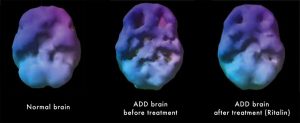
Attention Deficit Hyperactivity Disorder (ADHD) and Attention Deficit Disorder (ADD) are chronic physiological conditions that can cause hyperactivity, inattention, and impulsivity. The terms can be used interchangeably, however ADHD indicates a hyperactive component, while ADD refers to the core symptoms without the hyperactive part.
Both ADHD and ADD have serious and long lasting effects in the lives of kids, teens and adults. To properly implement ADHD/ADD counseling, it is critical to determine if the diagnosis is in fact ADHD/ADD, or if some other mental health or brain issue is causing and/or attributing to the symptoms and effects.
True ADHD is a function of a person’s biology and brain for a lifetime. The symptoms might be noticeable during early childhood, or certainly by junior high parents and children start to notice patterns. These symptoms don’t get better or resolve themselves as the child matures. Instead, they carry on through adulthood, causing problems in personal life, work life, self-image and relationships.
There are three symptom categories used to diagnose ADHD/ADD:
- Inattention
- Hyperactivity
- Impulsivity
Within these categories, there are different core symptoms of ADHD/ADD:
- A short attention span for regular, routine, everyday tasks such as homework, chores, etc.
- Distractibility
- Organization problems such as having a disorganized room and/or always running late
- Procrastination
- Problems with follow-through
- Poor impulse control, such as saying or doing something before thinking it through
- Restlessness/fidgety
- Being bored with times of over-focus on interesting activities
- Forgetfulness
- Difficulties in school or work performance
- Relationship conflicts
While ADHD/ADD has become a fall back explanation for many disruptive behaviors, ADHD/ADD must be appropriately diagnosed through a combination of screenings, personal history, testing and doctors’ assessments. It is also important to understand what other issues are causing or adding to the ADHD/ADD, such as depression, anxiety, OCD, brain or concussive trauma. Overlapping symptoms such as memory concerns, concentration and low motivation could be a function of other mental health issues.
Not surprisingly, misunderstanding ADHD/ADD can cause conflict at home and at school or work. School-aged children with ADHD/ADD can be accused of being lazy, not motivated, or putting in effort. This can eventually lead to the child/teen to become discouraged and despondent, or potentially to start to act out because they can’t live up to their own or other’s standards. In adults, ADHD/ADD conditions continue on if not addressed and treated. ADHD/ADD causes certain patterns and habits to emerge and persist, resulting in feeling overwhelmed and/or inadequate, withdrawing, or pushing against others. The impact on relationships can monumental and damaging without counseling and help.
ADHD/ADD counseling and treatment includes assessment, an action plan to include education and practical tools, and support to improve relationship communication and interactions. Additionally, nutrition, supplements, lifestyle and behavioral tools to change patterns are all key to living successfully with a diagnosis of ADHD. As an ADHD/ADD counselor, I may also refer a client to a psychologist for further testing or to a doctor (general practitioner or psychiatrist/psychiatric nurse) for medication as needed.
Please contact me to discuss you or your loved one’s situation to get an assessment and tools on how to navigate the impact of ADHD/ADD.
Resources:
Driven to Distraction by Drs. Hallowell and Ratey
Healing ADD-by Dr. Daniel Amen
The ADHD Effect on Marriage by Melissa Orlov
CHADD- Children and Adults with Attention Deficit/Hyperactivity Disorder
http://www.chadd.org/
Additude Magazine
https://www.additudemag.com/
